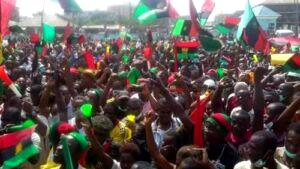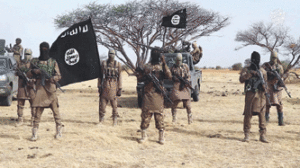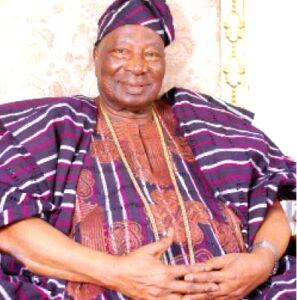

By Ladesope Ladelokun
PRESIDENT Buhari understandably stirred controversy recently when his media aide, Garba Shehu, informed Nigerians that his principal prayed for peace to reign in terror-ravaged Nigeria and its rescue from a tanking economy in Saudi Arabia.
Buhari had visited the Muslim country for the Future Investment Initiative Institute conference but had a stop-over at Madinah where Shehu said the president “spent quality time at the Mosque of the Holy Prophet Muhammed, Islam’s second holiest, engaging in prayers and recitation of the Holy Qur’an.”
Ordinarily, prayers said to the creator of heaven and earth should not spark fury, but prayers are never known to be an instrument of governance. In fact, it is safe to say no western country has charioted itself to greatness with prayers. It explains why pity has become the lot of a great number of Nigerians and why we may, for a long time, drink from the sour juice of misgovernance.
Is a prayer to God now completely useless? Should people stop praying to God because it is a fruitless exercise? Far from it. The efficacy of prayers cannot be disputed regardless of the faith – Islam, Christianity, et al – practiced. Remember Hannah – the Israeli woman who, as recorded in the Bible, was barren and unable to conceive for a long time, making her an object of mockery by Peninnah, her rival, before she bore Samuel?
What about the Biblical Elijah who prayed earnestly that no rain would fall, and none fell for three and a half years! Then, he prayed again and the skies opened. Indeed, prayer works. But God cannot be mocked. He does not answer all prayers. That, at least, was established in James 4:3 in the Christian Holy Book. In a country where injustice thrives and equal rights remain a mirage, praying for peace can only be tantamount to pouring water in a basket.
Right was Winston Hubert McIntosh, otherwise known as Peter Tosh, when sang these lines: “Everyone is crying out for peace, yes. None is crying out for justice. Everyone is crying out for peace, yes. None is crying out for justice. I don’t want no peace. I need equal rights and justice…What is due to Caesar, you better give it all to Caesar, yeah, yeah, yeah.”
Of course, the reggae icon hit the bull’s eye with his timeless sermon. Yes, musicians are preachers, depending on who you listen to. Call them teachers and you won’t be wrong. We had one in the late creator of Afrobeat, Fela Anikulapo-Kuti, who preached peace and taught Africans to have faith in themselves; not without scathing attacks on the oppressors of commoners which earned him a fractured skull from severe pummeling and loss of his property.
But paying heed to the sermon from Peter Tosh may just be all we need to douse the simmering tension in the South-East and other parts of Nigeria where agitations for secession have reached a boiling point. What is due to Caesar, he said, you better give it all to Caesar. May God give our leaders listening ears. Examples abound of cases where scant regard for the country’s diversity may have helped in fanning the embers of disunity, threatening to obliterate what is left of Nigeria.
In 2017, a report by Premium Times revealed how the Department of State Services, DSS, employed 51 recruits from Katsina, the home state of the president and the then DSS Director General Lawal Daura, while the entire South-South and South-East got 42 and 44 recruits respectively. Three years after the outrage that greeted that impunitous recruitment, an online newspaper, The Gazette, exposed another disturbing lopsided recruitment in favour of the North into the agency.
The report, which the newspaper said was based on official documents and contributions from senior intelligence officials, stated that while 535 northerners were employed, only 93 southerners were allegedly employed under Yusuf Bichi-led DSS.
Also, to the chagrin of right-thinking Nigerians who probably had no reason to be doubting-Thomases when he vowed to be for everybody and for nobody, Buhari has not deemed anyone good enough in the entire South-East to be appointed as service chief. But prayers cannot cancel the consequences of injustice and inequity.
Perhaps Buhari is keeping faith with his five per cent vs 97 per cent philosophy. Didn’t he say in 2015 that “the constituents, for example, that gave me 97 per cent cannot, in all honesty, be treated on some issues with constituencies that gave me five per cent”? Now we know why some regions appear to be sidelined from critical areas of democratic governance.
Despite the injustice and wickedness that pervade the land, even in high places, Nigeria is a highly religious country. We pray about everything. Comatose health sector. Poverty. Bad leadership. Falling naira value. Security. The more we pray, the more things remain the same. Even worse.
Ironically, in a survey by WIN/Gallup International, the world’s most populous country, China, is the least religious country in the world but ranks among the world’s richest, even when 90 percent of the country’s population, according to the said survey, consider themselves atheists.
Sadly, Nigeria, with its 97 percent religious population like Kosovo, has the dubious honour of having the highest population of the wretched of the earth. The WIN/Gallup International survey and Nigeria’s galloping poverty rate lay bare the folly of praying a country out of economic doldrums. How, for instance, does prayer magically halt the free fall of the naira and make it equivalent to the dollar in a country that is hugely export-dependent?
In a Facebook post, yours truly’s former boss and the late Senator Chuba Okadigbo’s ex-aide, Mr. Innocent Nwankwo, schooled today’s tribe of leaders on how not to tackle Nigeria’s many problems. The one we call Onyisi wrote: “In the mid 70s when the British economy faltered and was about to be sluiced away, an Amazon – Margaret Thatcher – arose to challenge the behemoth.
The dollar was cruising into Zimbabwean dollar altitudes. The naira was nearly £1 = N2. Margaret Thatcher never went to Canterbury, Rome or Jerusalem holy sites, she assembled the best British brains, shed some economic overweight, privatised some parastatals, subsidised businesses…Margaret Thatcher pulled through. She stabilised the economy. The Sterling resurged and British companies became competitive again worldwide.”
Nigeria needs more than ever thinking leaders and revolutionaries in the mould of Thatcher and Lula Da Silva of Brazil that would rise above sectionalism, nepotism, narrow-mindedness to bring prosperity to the Nigerian people. We no longer deserve leaders who outsource their responsibilities to God while the country burns and sinks deeper into the abyss of poverty.
Ladelokun, a social commentator, wrote via ladesopeladelokun@gmail.com
The post Between a floundering country and futility of prayers appeared first on Vanguard News.







0 Commentaires